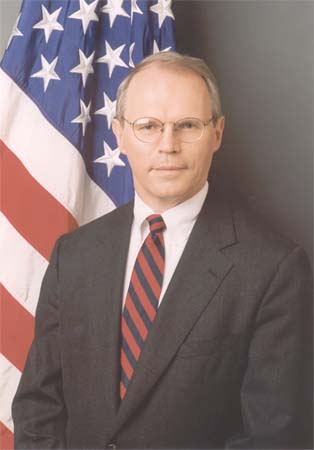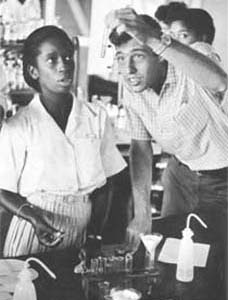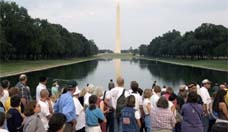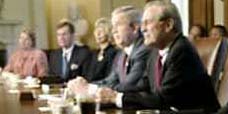
RPCV Christopher Hill emphasized that "the President's policy is to achieve denuclearization of the Korean Peninsula through peaceful means, specifically, through the multilateral diplomacy of the Six-Party Talks"
North Korea's Nuclear Program Called Multilateral Threat
North Korea's nuclear programs are a multilateral threat and require a multilateral solution, says Ambassador Christopher Hill, President Bush's nominee for assistant secretary of state for East Asian and Pacific affairs.
At his March 15 confirmation hearing before the Senate Foreign Relations Committee, Hill emphasized that "the President's policy is to achieve denuclearization of the Korean Peninsula through peaceful means, specifically, through the multilateral diplomacy of the Six-Party Talks," which include North and South Korea, Japan, China, Russia and the United States.
"In spite of North Korea's rhetoric," he added, "President Bush and Secretary [of State Condoleezza] Rice have made clear we have no intention of invading or attacking North Korea."
Hill, a career member of the Foreign Service, is currently the U.S. ambassador to the Republic of Korea.
He cautioned that the Korean peninsula remains a dangerous corner in the Asia-Pacific region. "North Korea's self-imposed isolation and threatening posture are at odds with positive trends in the region. The misery and famine, which its policies have brought on its people, cannot possibly be justified morally or politically," he said.
But North Korea, Hill said, now has a historic opportunity "to join the mainstream of this very prosperous region, to transform positively its relations with the international community, and to benefit in terms of enhanced trade, aid, and investment opportunities." To do so, however, it must dismantle its nuclear programs in a "complete, verifiable and irreversible" manner, he said.
Hill said good U.S. relationships with countries in the Asia-Pacific region paid off when the time came to respond to the recent Indian Ocean tsunami.
"The effectiveness of our response was largely due to the speedy effectiveness of our diplomacy and to the solid military-to-military relationships established over many years in the region," he said.
He cautioned that "the extraordinary dynamism" of the Asia-Pacific region means that continued positive trends cannot be taken for granted.
"Globalization, technological innovation, growing transnational issues, and financial interdependence will have an increasing and possibly unpredictable role in the future," he said.
Following is the text of Hill's remarks
Ambassador Christopher Hill
Senate Foreign Relations Committee
Confirmation Hearing Statement
March 15, 2005
Mr. Chairman, members of the Foreign Relations Committee, it is a great honor to appear before you in connection with my nomination to the position of Assistant Secretary for East Asian and Pacific Affairs.
I am especially grateful to President Bush and to Secretary Rice for placing their faith in me and for nominating me to serve our country in this post. Our relations with the East Asia-Pacific region are among the most important we have in the world and I appear before you quite humbled at the thought of the challenges that lie ahead.
If I am confirmed by the Senate, I look forward to working closely with the members and the staff of this Committee, as well as with others in both houses of Congress in support of our country's interests in this vital and dynamic region.
It will also be my great privilege to work closely with Secretary Condoleezza Rice and Deputy Secretary Robert Zoellick as well as the many talented members of the Foreign and Civil Service and Foreign Service National employees who have dedicated their professional careers to the service of our country here and abroad.
As a career member of the Foreign Service, it has been my privilege to serve five Presidents and ten Secretaries of State. From my earliest days of international service as a Peace Corps volunteer in Cameroon to my current position as Ambassador to the Republic of Korea (ROK), I have had the opportunity to understand the role that our country plays in the world, the example we set, and the importance we have for our friends and foes alike. If confirmed, I will continue to articulate our American values and ideals, and pursue our country's interests with all the energy, experience, and skills that I have.
My assignment as Ambassador to Seoul, Korea, in July 2004, took me back to the post where I served in the late 1980s, earlier in my State Department career. Like many East Asian countries, the Republic of Korea has changed dramatically during that time span, progressing from a developing country to a mature and powerful economy and a thriving and lively democracy. Korea has become, in an important sense, a model for emulation in the region and beyond. If anyone doubts the tremendous benefits to be obtained by following a path of economic freedom and personal liberty - Korea offers a shining example for the world.
As I noted, Korea is a society undergoing rapid change. Recognizing this fact, and eager both to understand this transformation and be a part of it, during my tenure as Ambassador, I have sought out the new generation of Koreans through traditional diplomacy and ever more through public diplomacy. The Embassy reached out to make new friends for America and in doing so brought new energy to our public diplomacy. I believe our efforts have paved the way for the smooth restructuring of the U.S. military presence in South Korea and the ROK's central role in working with us in the Six-Party process to eliminate North Korea's nuclear programs. It also laid the groundwork for new developments in our ties, including our cooperation in rebuilding Iraq and giving hope to its people. The vitality and importance of our bilateral relationship was never more clearly demonstrated than when the ROK took the decision to contribute $260 million and to dispatch military personnel to aid in the reconstruction of Iraq.
Nevertheless, the Korean peninsula remains a dangerous corner in the region. North Korea's self-imposed isolation and threatening posture are at odds with positive trends in the region. The misery and famine, which its policies have brought on its people, cannot possibly be justified morally or politically.
Two points need to be clearly recognized. First, the President's policy is to achieve denuclearization of the Korean Peninsula through peaceful means, specifically, through the multilateral diplomacy of the Six-Party Talks. The DPRK's nuclear programs are a multilateral threat and we seek a multilateral solution. In spite of North Korea's rhetoric, President Bush and Secretary Rice have made clear we have no intention of invading or attacking North Korea.
The second point is that the DPRK now has an historic opportunity to join the mainstream of this very prosperous region, to transform positively its relations with the international community, and to benefit in terms of enhanced trade, aid, and investment opportunities. To achieve these goals, the DPRK must dismantle its nuclear programs, plutonium and uranium, in a manner that is complete, verifiable and irreversible. The Six-Party Talks is the way forward, and we are working with Japan, the ROK, China, and Russia to bring the DPRK to understand that it is in its self-interest to make that decision.
As the head of the U.S. delegation to the Six-Party Talks, I am committed to their success. I have met face-to-face with representatives of the participating countries and listened with great care to their concerns.
In past assignments, I have been privileged to serve as Special Envoy for Kosovo and as a member of U.S. negotiating team that crafted an agreement to end the brutal and deadly conflict in the former Yugoslavia. I have also had tours as Ambassador to Macedonia and Poland and served as the Special Assistant to the President and Senior Director for Southeast European Affairs for the National Security Council.
The dynamics of change under way in the Asia-Pacific region are as dramatic as the changes brought about by the fall of the Berlin Wall in Eastern Europe. As the President has championed the cause of freedom and the promotion of democracy around the globe, we can look to East Asia for many success stories. In the past year we have been encouraged by elections in Japan, the Republic of Korea, Taiwan, Mongolia, the Philippines, Malaysia, Australia, Indonesia, and Thailand. We especially appreciate the example that Indonesia, the world's most populous Muslim majority nation, sends to other countries in terms of its vibrant new democracy, free press, and religious diversity.
We are impressed by the region's rising prosperity, widespread rejection of militant Islam and terrorism, growing concern for human rights and religious freedom, and expanding regional cooperation that is addressing transnational issues, such as human trafficking, international crime, environmental degradation, and the spread of infectious diseases, including HIV/AIDS.
We are committed to bolstering our relationships with our long-standing treaty allies, Japan, Korea, Australia, Thailand, and the Philippines and to strengthening our strategic dialogue with Singapore.
These relationships can bear unexpected fruit. The international response to the recent Indian Ocean tsunami was a remarkable reflection of generosity of the United States and other donor nations. The effectiveness of our response was largely due to the speedy effectiveness of our diplomacy and to the solid military-to-military relationships established over many years in the region. The United States assembled a Core Group of like-minded nations virtually overnight, and this group sparked an unprecedented outpouring of cooperation and international support for this important humanitarian cause. Our military, our aid workers, our diplomatic missions, and non-governmental organizations worked hand-in-hand as never before. Key partners in the region and beyond - Japan, Australia, India, the UN - worked with us seamlessly and effectively. Regional allies contributed in major ways - not the least of which was Thailand's provision of Utapao Air Base as a major staging point in the international effort to airlift supplies to affected areas.
Today, while the initial emergency response is over, the United States remains deeply involved in the next phase of the international response to this tragedy as USAID and others - including the U.S. private sector - are dedicated to reconstructing devastated communities and rebuilding shattered lives.
As we look elsewhere in the region, the challenges and opportunities are many.
With China, we are committed to an across-the-board, results-oriented, constructive and candid relationship. There are many issues on which we can and do cooperate - from the global war on terror to HIV/AIDS. There are also areas in which we disagree, such as human rights, Taiwan, and intellectual property rights. But, great countries like the U.S. and China will always have disagreements. I intend to confront those differences forthrightly and creatively, in a way that enhances our cooperation bilaterally, regionally, and on behalf of the international community, while protecting U.S. interests.
With our long-standing ally, the Philippines, we have a partnership based on support of democracy, free markets, and regional and world peace and stability. The Philippines faces a terrorist threat from extremist groups like Abu Sayyaf and Jemaah Islamiyah, and from the Communist New Peoples Army. We remain committed to helping the Philippines defeat terrorism.
Under newly elected President Yudhoyono, Indonesia has taken on the menace of terrorism, arresting over 130 suspected terrorists and convicting over 100 since the Bali bombings in October 2002. We will continue to encourage Indonesia to remain vigilant on this front.
We have called upon the political leadership of the Royal Cambodian Government to allow all its citizens to express their political views peacefully and without fear of retribution or intimidation. We will continue to work with Laotian authorities on human rights concerns.
We will continue to be highly critical of the Burmese junta and its destructive policies. The detention of Nobel laureate Aung San Suu Kyi and other pro-democracy leaders and the sham National Convention portend a pessimistic future for that Southeast Asian country.
I am also mindful that the extraordinary dynamism of the East Asia-Pacific region means that continued positive trends cannot be taken for granted. Globalization, technological innovation, growing transnational issues, and financial interdependence will have an increasing and possibly unpredictable role in the future. If confirmed by the Senate, I will monitor the development of these issues carefully to ensure that American interests are promoted and protected.
I will faithfully execute the responsibilities and duties of the Assistant Secretary of State for East Asian and Pacific Affairs and consult frequently with a broad and diverse range of members of Congress.
Finally, I will seek to strengthen our five treaty alliances in the EAP region as they adapt to changing circumstances; promote mutual understanding of United States policies in the region through enhanced public diplomacy; broaden and deepen our economic and trade relations through business advocacy and support for international trade agreements; pursue vigorously our U.S. national interests; defend human rights and religious freedom; and manage our resources as effectively and efficiently as possible.
That will be my mission, if you approve my nomination. My ability to fulfill it will depend on the skill and energy of the superb professionals whom I will have the privilege of leading. It will also depend on your support and advice, which I intend to seek often.
Thank you. I would be pleased to answer your questions.















